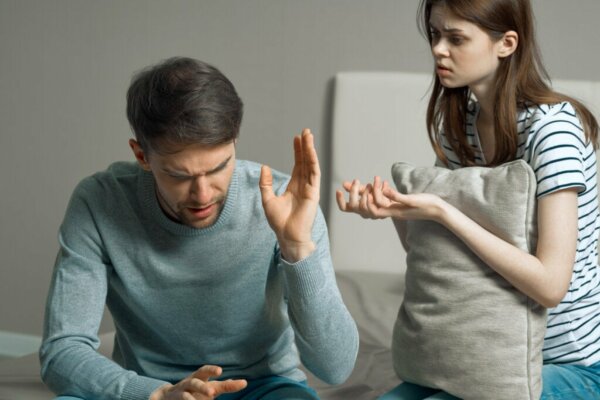How to Spot an Abusive Relationship


Reviewed and approved by the psychologist Gema Sánchez Cuevas
Experts claim that in order to determine whether or not you’re in an abusive relationship, you need to analyze your feelings. You must be as objective as possible, otherwise, you’ll just be fooling yourself, and your partner too.
There are many factors that can indicate your relationship isn’t going too well. For example, you might feel criticized, tense, sad, anguished, fearful, rejected, ignored, useless, unimportant, isolated, and guilty. Furthermore, you may find yourself being forced to pretend to be happy in order to make your partner happy. You also might find yourself putting aside your own interests to please them or avoid a fight. As a matter of fact, it may well feel as if your life is spiraling out of control.
Of course, it’s possible to experience some of these feelings at certain moments in any relationship. However, the problem lies when they become the rule and not the exception. Therfore, if you experience any of these feelings two or three times a week or for months on end, you need to start taking a long hard look at your relationship and what it’s doing for you. Acting as soon as possible often gives good results. On the other hand, if you sit idly by, waiting for an answer to drop out of the sky, everything may well end extremely badly.

To start with, you must stop denying that there are problems in your relationship This doesn’t necessarily mean that you’re preempting a bad outcome but it’ll help you avoid the future pain that a separation may cause. Many people make the mistake of ‘getting used’ to an unhealthy relationship, clinging to the good memories of when their partner was different. In this way, the situation is never solved. In fact, it usually gets worse.
Recognizing an abusive relationship
Here are some signs that you’re facing a situation of abuse. Your partner frequently ridicules you in front of your friends or family and criticizes or makes fun of you for everything you do. They’re insulting to you and they say hurtful words, and manipulate you with threats, lies, silence, or unfinished sentences. They never recognize your qualities, they use body or facial expressions to scare you and resent you seeing your loved ones. They don’t allow you to do what you want yet tend to be overly affectionate after they’ve behaved badly. If you recognize any of these signs, it’s vital that you put the brakes on. Otherwise, you’ll regret it in the future.
Do something about it
It’s proven that abuse increases if nothing is done about it. It doesn’t necessarily mean that your partner is a bad person, a murderer, or an ogre, but maybe they simply don’t realize what they say or how it makes you feel. They’ll probably make thousands of promises to you that they’re going to change yet they always return to the same behavior. Furthermore, they blame it on you, telling you they did it because “You made me nervous” or “You don’t listen to me” or “I just had had too much to drink”. You should always bear in mind that you could be ultimately responsible if you allow things to go from bad to worse. Of course, this doesn’t lessen your abuser’s guilt in any way. Nevertheless, it’s always advisable to prevent the abuse from worsening if you can.
Getting out of an unhealthy relationship in time is one of the most difficult things you’ll ever have to do. That’s because it involves such an extremely close relationship. If your partner manipulates you as well, things will be even harder. These kinds of abusers often enjoy their behavior, so it’s really difficult for them to change it. Furthermore, they’ll always try to justify what they do, since they’re convinced that they’re correct or that the other person ‘asked for it’.

Emotional abuse: A scourge of society
There are more cases of domestic violence than appear in the media. It doesn’t always involve physical abuse like beatings. As a matter of fact, emotional abuse is the most dangerous because it goes deeper than a slap in the face or a clenched fist. You might even know people who are going through this situation yet you don’t realize it because it’s not as evident as those who appear nursing a black eye. Emotional abuse greatly damages a person and, in many cases, that injury can be permanent. That’s why it’s said that it’s more dangerous than a physical blow.
However, fights and arguments aren’t always synonymous with violence. All couples argue. In fact, if they don’t, this should be cause for concern as it’s impossible for two people to agree 100 percent of the time. Nevertheless, emotional violence goes beyond a simple disagreement concerning expenses, finances, or children. It’s about something deeper. Something that reaches the farthest reaches of the heart and settles there.
Acknowledge the abuse
If you’re on the receiving end of this kind of violence, you’ll change your attitude, lifestyle, customs, in fact, everything to please your partner. However, detecting emotional abuse is difficult. Some clear signs are low self-esteem, depression, constant anguish for no apparent reason, isolation from close people, feelings of shame, self-loathing, fear, insecurity, guilt, passive attitude or extreme complacency, denial of the problem, not accepting help from a professional, lying, resorting to addiction, etc.
Remember that acknowledging abuse is the first step in stopping it. Don’t let more time go by. Seek help. Stop taking the blame for your partner and assuming responsibility for their mistakes. Don’t allow yourself to be manipulated, and ensure you never fall prey to emotional blackmail.
Experts claim that in order to determine whether or not you’re in an abusive relationship, you need to analyze your feelings. You must be as objective as possible, otherwise, you’ll just be fooling yourself, and your partner too.
There are many factors that can indicate your relationship isn’t going too well. For example, you might feel criticized, tense, sad, anguished, fearful, rejected, ignored, useless, unimportant, isolated, and guilty. Furthermore, you may find yourself being forced to pretend to be happy in order to make your partner happy. You also might find yourself putting aside your own interests to please them or avoid a fight. As a matter of fact, it may well feel as if your life is spiraling out of control.
Of course, it’s possible to experience some of these feelings at certain moments in any relationship. However, the problem lies when they become the rule and not the exception. Therfore, if you experience any of these feelings two or three times a week or for months on end, you need to start taking a long hard look at your relationship and what it’s doing for you. Acting as soon as possible often gives good results. On the other hand, if you sit idly by, waiting for an answer to drop out of the sky, everything may well end extremely badly.

To start with, you must stop denying that there are problems in your relationship This doesn’t necessarily mean that you’re preempting a bad outcome but it’ll help you avoid the future pain that a separation may cause. Many people make the mistake of ‘getting used’ to an unhealthy relationship, clinging to the good memories of when their partner was different. In this way, the situation is never solved. In fact, it usually gets worse.
Recognizing an abusive relationship
Here are some signs that you’re facing a situation of abuse. Your partner frequently ridicules you in front of your friends or family and criticizes or makes fun of you for everything you do. They’re insulting to you and they say hurtful words, and manipulate you with threats, lies, silence, or unfinished sentences. They never recognize your qualities, they use body or facial expressions to scare you and resent you seeing your loved ones. They don’t allow you to do what you want yet tend to be overly affectionate after they’ve behaved badly. If you recognize any of these signs, it’s vital that you put the brakes on. Otherwise, you’ll regret it in the future.
Do something about it
It’s proven that abuse increases if nothing is done about it. It doesn’t necessarily mean that your partner is a bad person, a murderer, or an ogre, but maybe they simply don’t realize what they say or how it makes you feel. They’ll probably make thousands of promises to you that they’re going to change yet they always return to the same behavior. Furthermore, they blame it on you, telling you they did it because “You made me nervous” or “You don’t listen to me” or “I just had had too much to drink”. You should always bear in mind that you could be ultimately responsible if you allow things to go from bad to worse. Of course, this doesn’t lessen your abuser’s guilt in any way. Nevertheless, it’s always advisable to prevent the abuse from worsening if you can.
Getting out of an unhealthy relationship in time is one of the most difficult things you’ll ever have to do. That’s because it involves such an extremely close relationship. If your partner manipulates you as well, things will be even harder. These kinds of abusers often enjoy their behavior, so it’s really difficult for them to change it. Furthermore, they’ll always try to justify what they do, since they’re convinced that they’re correct or that the other person ‘asked for it’.

Emotional abuse: A scourge of society
There are more cases of domestic violence than appear in the media. It doesn’t always involve physical abuse like beatings. As a matter of fact, emotional abuse is the most dangerous because it goes deeper than a slap in the face or a clenched fist. You might even know people who are going through this situation yet you don’t realize it because it’s not as evident as those who appear nursing a black eye. Emotional abuse greatly damages a person and, in many cases, that injury can be permanent. That’s why it’s said that it’s more dangerous than a physical blow.
However, fights and arguments aren’t always synonymous with violence. All couples argue. In fact, if they don’t, this should be cause for concern as it’s impossible for two people to agree 100 percent of the time. Nevertheless, emotional violence goes beyond a simple disagreement concerning expenses, finances, or children. It’s about something deeper. Something that reaches the farthest reaches of the heart and settles there.
Acknowledge the abuse
If you’re on the receiving end of this kind of violence, you’ll change your attitude, lifestyle, customs, in fact, everything to please your partner. However, detecting emotional abuse is difficult. Some clear signs are low self-esteem, depression, constant anguish for no apparent reason, isolation from close people, feelings of shame, self-loathing, fear, insecurity, guilt, passive attitude or extreme complacency, denial of the problem, not accepting help from a professional, lying, resorting to addiction, etc.
Remember that acknowledging abuse is the first step in stopping it. Don’t let more time go by. Seek help. Stop taking the blame for your partner and assuming responsibility for their mistakes. Don’t allow yourself to be manipulated, and ensure you never fall prey to emotional blackmail.
This text is provided for informational purposes only and does not replace consultation with a professional. If in doubt, consult your specialist.







